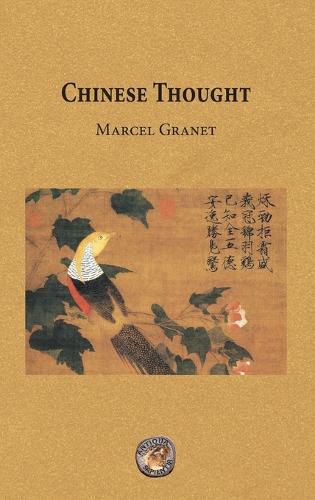Readings Newsletter
Become a Readings Member to make your shopping experience even easier.
Sign in or sign up for free!
You’re not far away from qualifying for FREE standard shipping within Australia
You’ve qualified for FREE standard shipping within Australia
The cart is loading…






This title is printed to order. This book may have been self-published. If so, we cannot guarantee the quality of the content. In the main most books will have gone through the editing process however some may not. We therefore suggest that you be aware of this before ordering this book. If in doubt check either the author or publisher’s details as we are unable to accept any returns unless they are faulty. Please contact us if you have any questions.
As a whole, this work offers a panoramic view of ancient Chinese thought, which is not a thought structured after the Western style, since the Chinese ask their Sages for subjects conducive to free meditation, not ideas, much less dogmas. It does not matter whether they classify the Master who awakens in them the play of the intellect as Taoist or Confucian; it does not matter whether the practices that prepare them for the liberation of their spirit are aimed at creating the impression of unconditioned autonomy or at creating the feeling of the sovereign dignity of man. Neither the actual purpose of the training, nor the spirit of the methods themselves differ. It is always a matter of training the whole being. Whether holiness or wisdom is sought, whether it is accomplished by sanctifying games or ennobling rites, this training is always inspired by a desire for liberation, and it is always done in a spirit of freedom.
The first three Books-or sections-of this work aim to make known Chinese conceptions that the author considered neither possible, nor advantageous to present otherwise than as common notions, that denote certain habits of mind to which the Chinese seem to attribute imperative power. Granet reserves for the fourth and last book (Sects and Schools) those conceptions that he considered possible to study comfortably in relation to specific works that testify to certain directions of Chinese thought; these conceptions point to less constant or less profound tendencies and are remarkable precisely because of their varying fortunes; their main interest is that they can contribute to giving an idea of the orientation that Chinese thought as a whole has acquired.
$9.00 standard shipping within Australia
FREE standard shipping within Australia for orders over $100.00
Express & International shipping calculated at checkout
This title is printed to order. This book may have been self-published. If so, we cannot guarantee the quality of the content. In the main most books will have gone through the editing process however some may not. We therefore suggest that you be aware of this before ordering this book. If in doubt check either the author or publisher’s details as we are unable to accept any returns unless they are faulty. Please contact us if you have any questions.
As a whole, this work offers a panoramic view of ancient Chinese thought, which is not a thought structured after the Western style, since the Chinese ask their Sages for subjects conducive to free meditation, not ideas, much less dogmas. It does not matter whether they classify the Master who awakens in them the play of the intellect as Taoist or Confucian; it does not matter whether the practices that prepare them for the liberation of their spirit are aimed at creating the impression of unconditioned autonomy or at creating the feeling of the sovereign dignity of man. Neither the actual purpose of the training, nor the spirit of the methods themselves differ. It is always a matter of training the whole being. Whether holiness or wisdom is sought, whether it is accomplished by sanctifying games or ennobling rites, this training is always inspired by a desire for liberation, and it is always done in a spirit of freedom.
The first three Books-or sections-of this work aim to make known Chinese conceptions that the author considered neither possible, nor advantageous to present otherwise than as common notions, that denote certain habits of mind to which the Chinese seem to attribute imperative power. Granet reserves for the fourth and last book (Sects and Schools) those conceptions that he considered possible to study comfortably in relation to specific works that testify to certain directions of Chinese thought; these conceptions point to less constant or less profound tendencies and are remarkable precisely because of their varying fortunes; their main interest is that they can contribute to giving an idea of the orientation that Chinese thought as a whole has acquired.